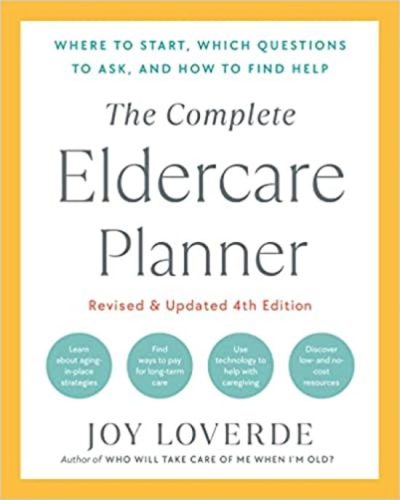Who will take care of me when I’m old? This unsettling question is on the minds of millions of people who have never married, are separated, divorced, or widowed. With people living longer than ever, if we live long enough, all of us can expect to age solo.
In recent years, the definition of solo aging has evolved to include a parent with adult children. The reason behind this is the harsh reality that sons and daughters may be unavailable or unwilling to take on family caregiving responsibilities.
Ask the right questions about aging in place.
Aging in place has a shelf life when you live alone. To manage the challenges of remaining in your own home, The Complete Eldercare Planner, 4th edition offers specific action steps and questions to ask to start the process of planning immediately. Here are a few questions to consider:
- Am I prepared to be an employer? Am I up to the task of hiring and firing paid care workers? What personal safety precautions are in place for me to allow strangers into my home?
- Will the money well run dry?What are the going rates for home-delivery services, housecleaning, or yard work? Is the house in need of repair?
- Is forgetfulness a problem? Not remembering to take medications or turn off the stove can have serious consequences.
Decide who will help with long-term support.
Our nation’s in-home care worker industry is broken. Minimum wages, unpredictable work schedules, exhausting work, and lack of recognition as essential workers to qualify for employee benefits keep job seekers away from the industry.
There is no indication that the number of in-home care workers will increase anytime soon, so now is the time to take matters into your own hands.
If moving into a continuing care retirement community is how you plan to be cared for, visit one now. With the aging of millions of baby boomers coupled with the in-home care worker shortage, few people realize that most of these communities now have long and growing wait lists.
Another approach to getting assistance is creating a support network of friends, volunteers, and professionals. Ask the following questions:
- Are my trusted friends ready, willing, and able to be there for me?
- Am I a member of any social clubs or business organizations that offer long-term care benefits?
- Does my place of worship offer long-term care support services?
- Am I eligible for eldercare or retirement benefits through an employer?
Plan to avert isolation and loneliness.
One of the most significant challenges of living alone is overcoming isolation and loneliness. Although living alone doesn’t inevitably lead to loneliness, the two often go hand-in-hand.
Working part-time and full-time, and volunteering are effective ways to stay connected to people young and old. My book, Who Will Take Care of me When I’m Old? offers many resources to help avert isolation and loneliness. Making the effort to get out of the house is the first step.


